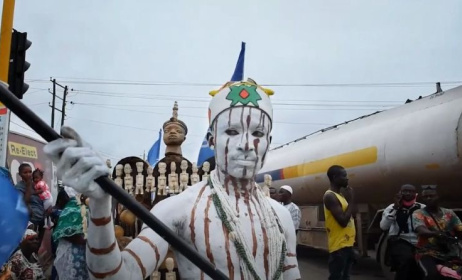‘Unknown’ music discussed in Lagos
 Kora master and educator Tunde Jegede. Photo: Richard Kaby/Wikipedia
Kora master and educator Tunde Jegede. Photo: Richard Kaby/Wikipedia
Chronicling his early acquaintance with music, Jegede explained his preverbal dalliance with drums and then the kora and cello. He expressed disappointment upon realising that no effort has been put into saving music from the past in Nigeria. Correcting this, he said, is one of the plans he has since taking up his position at the MUSON.
Jegede introduced the Living Legacies Archive in Gambia. The idea of the archive is to connect “music of the past with players of the present”. He drew laughs from the audience when explaining that at some point he was faced with a new group of students he was to teach ‘African music’ but without any African instruments. That lack has now been remedied to some extent. He also spoke about integrating Classical European music with Classical African music. Traditional African music, he added, is “a rich resource that is untapped”.
For his part, Kizilgoz, who based his talk on the baglama, a Turkish instrument, said the session was tagged ‘unknown’ music because these types of music were present but not known to a wider audience. Part of the problem, he claimed, is the absence of institutions teaching these types of music and also that traditional musical notations in Turkey are unknown in Europe, thus making it difficult to transfer knowledge.
Both speakers agreed that there is a need for more than just commercial music. According to Jegede, “to reduce it to just entertainment short-changes the society in which this is happening.”
As the session came to a close, a member of the audience asked Kizilgoz if an instrument recently heard aboard a Turkish Airline flight was the baglama. “I don’t know,” the Turkish-born German laughed. “It may not be. It could be…”



























Commentaires
s'identifier or register to post comments